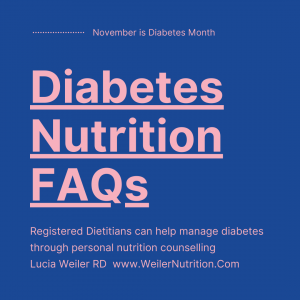Diabetes Nutrition – Top 5 FAQ
November is Diabetes Month and a great time to check in on the concerns of people at risk or living with Diabetes. With so much free information online, as a dietitian I’m often asked questions about facts versus myths. Read on for credible tips and answers to 5 frequently asked questions about nutrition and diabetes.
There are many factors that help to manage diabetes and food is an important one. We have long known that a balanced diet helps lead to better blood sugar control. But taking care of diabetes can be demanding and implementing a healthy way of eating is easier said than done. Registered Dietitians are here to help you along the way. Contact us for more information and support to help manage diabetes through personal nutrition counselling.
Q: Can I get rid of type 2 diabetes if I stop eating carbs?
A: Once you have been diagnosed with diabetes you cannot ‘get rid’ of it, but you can find ways to help control it. Through diet and lifestyle changes many people find that they can control blood sugar levels. Your goal should be to manage the amount and type of carbohydrate that meets your body’s needs, not to eliminate carbs. You need the carbohydrates as energy for your brain and other body cells and they also provide many essential nutrients. Set your carbohydrate targets with the help of a healthcare professional.
Q: Do I need to give up fruit since it’s full of carbohydrate?
A: You can still enjoy fruit, you just need to know the amount that’s right for you in your meals and snacks. All fruit (fresh, frozen, dried, and canned without added sugar) are mainly carbohydrate foods. Fruit is a healthy food choice because it contains vitamins, minerals and fibre that are important for overall health. Your dietitian can help create a meal plan that will include the amount of fruit that is right for you.
Q: Is brown sugar better for me than white sugar?
A: No. All types of sugars will affect your blood glucose levels in the same way and are digested in the same way. Sugars differ in colour, flavour and crystal size, but whether it’s honey, brown sugar, agave syrup, brown or white sugar, nutritionally speaking, they are much the same. Your body can’t tell the difference between where the sugars come from and uses them all as easily digested carbohydrates for energy. The key to eating added sugars is to choose them in relatively small amounts and find ways to eat and use less.
Q: How do I read the Nutrition Facts Table for sugars?
A: The Nutrition Facts Table lists total sugars. Check for the word “Carbohydrates” and then look below it to find the amount of sugar (in grams) in one serving of the food. The amount of sugar on the Nutrition Facts Table combines both naturally occurring and added sugars found in the food. Look at the ingredient list to see if a food has added sugars. The Canadian Diabetes Association recommends that added sugars and sweetened foods be used in moderation. Reading Nutrition Labels can teach you about how the foods you buy may affect your blood glucose levels. Registered Dietitians can help with label reading.
Q: How can I stay motivated to take care of myself?
A: Being newly diagnosed can be an intimidating experience. Taking care of diabetes and getting through your daily responsibilities is demanding. With these challenges it’s understandable that staying motivated is tough. You’re not alone and we have tools and resources to help you succeed and live your healthiest life possible. We’d like to offer some tips to help you get started:
- Have a plan
- Make small meaningful changes that you can keep up in the long run
- Get support
If you’re looking for more 1:1 nutrition support, education and life changing advice to move your diabetes management plan forward reach out to us.
